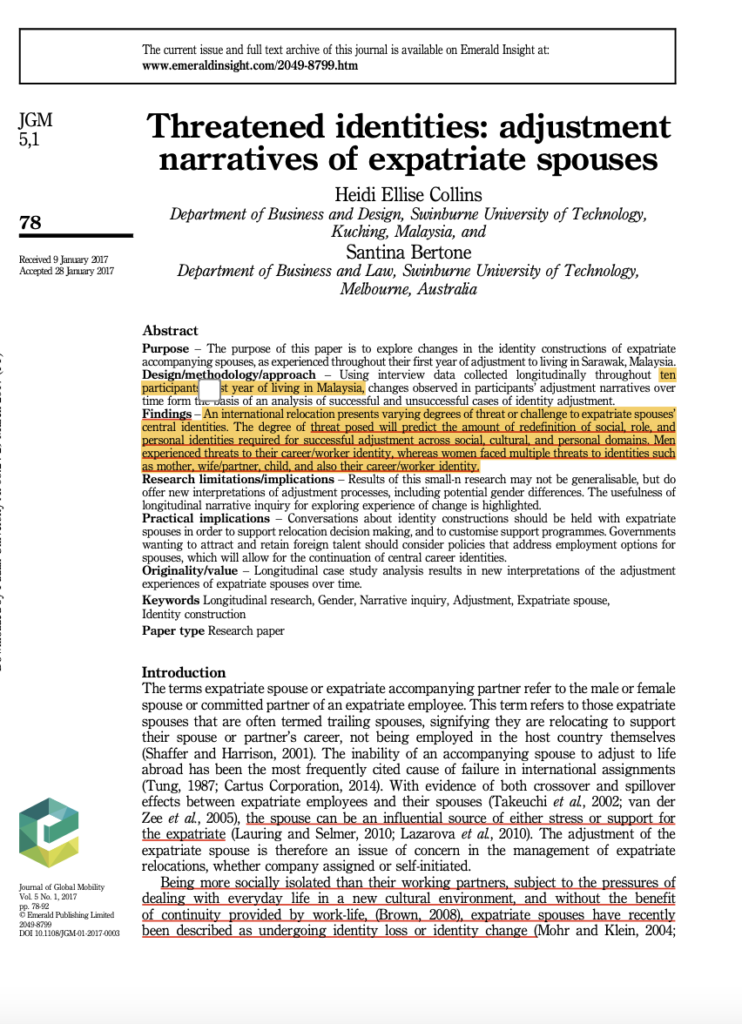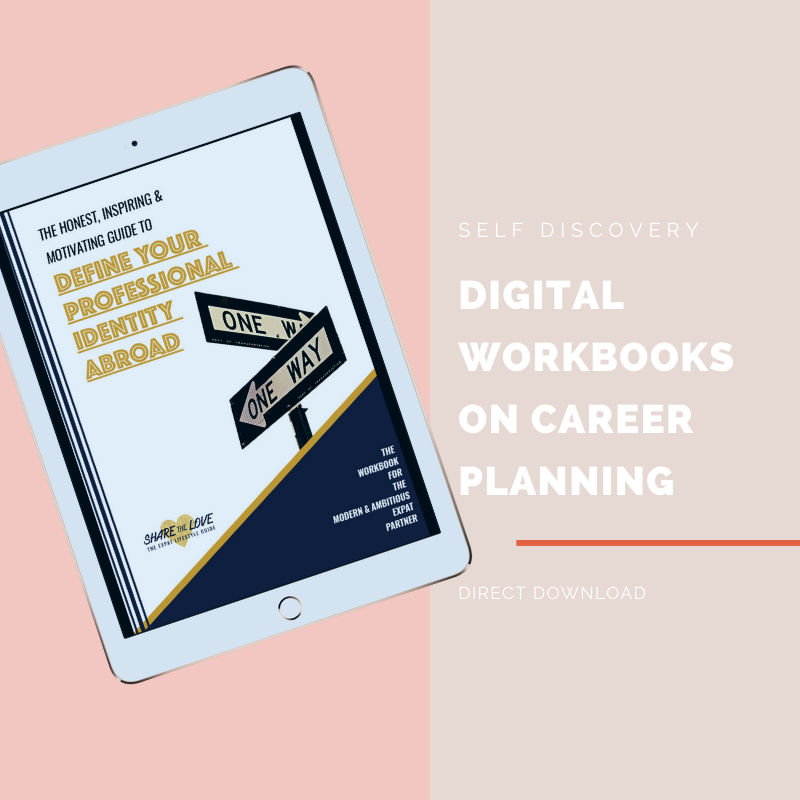
The threat of expatriation for the expat spouse
Insights into how the spouses’ identity is affected by her changing roles abroad
An international relocation presents varying degrees of threat or challenge to expatriate spouses‘ happiness. In this blog post, I explain why that is and reveal the key ingredient to master the journey of moving countries with a sense of fulfillment and happiness.
About the study
The purpose of this paper is to explore changes in the identity constructions of expatriate accompanying spouses, as experienced throughout their first year of adjustment to living in Sarawak, Malaysia.
An international relocation presents varying degrees of threat or challenge to expatriate spouses’ central identities. The degree of threat posed will predict the amount of redefinition of social, role, and personal identities required for successful adjustment across social, cultural, and personal domains. Men experienced threats to their career/worker identity, whereas women faced multiple threats to identities such as mother, wife/partner, child, and also their career/worker identity.
How to access
More info and download here.
A long term study of expat spouses' adaptation abroad
Next to other insightful research papers in that field, I am quoting from the paper of Collins and Bertone (2017) headlined „Threatened identities: adjustment narratives of expatriate spouses“. You can access the paper here. I especially like this study as it interviewed 10 expat spouses (including men) over a longer period. Hence, the authors were able to see which participant managed expatriation with ease and who struggled with adapting to the new surrounding and were able to observe the learning curve along the way. A long-term observation is definitely interesting as we go through different emotional phases when moving abroad. (If you want to learn more about these phases check out this blog post here.)
So let’s dive into this week’s blog post which is especially very valuable for you in case you are A) wondering about whether to move abroad or B) are living abroad right now and face challenges with your sense of belonging and fulfillment.
The main problem: The threat to your identity
Generally speaking, one can say that the expat partner is socially more isolated than their working partner. While one is welcomed with a new task, the other is subject to the pressures of dealing with everyday life in a new cultural environment, and without the benefit of continuity provided by work-life. Even if the partner has the best intention to find work right away she is going through a time of transition.
This is the pre-condition for the dilemma. The discontinuity challenges the expat partners on several levels and triggers the question: Who am I?
So we are quickly talking about the identity dilemma of the expat partner. Research has shown that there is a direct connection between happiness, adaptation, and identity shift.
What is identity in the first place?
"Identity has been defined as “the self-meanings that define who one is”
„Identity has been defined as “the self-meanings that define who one is” (Collins and Bertone).
Our identity helps us to position ourselves in our daily environment. It defines us to the extent that we follow a purpose and are happy when acting according to our values and our identity. The moment we feel detached from our familiar identity we start to question our role in society and the value we contribute.
We derive our identity from the different roles we have in our lives and from the different social circles we surround ourselves with.
These parts of our identity could be e.g.:
- being a mother
- a wife
- a daughter
- a career woman
- an entrepreneur
- a creative person
- an athletic
- a food connoisseur
- a religious person
- You name it 🙂
A defintion
“Identity” in its present incarnation has a double sense. It refers at the same time to social categories and to the sources of an individual’s self-respect or dignity.“ (Fearson et al. 1999)
Side-note: we can differentiate between the social identity approach and the role-based identity theory. Both theories help us to understand the essence of our identity and why it triggers so many emotions and question marks when the identity we are familiar with is under attack.
Once we move abroad some of those identity parts come to a sudden hold. Some are challenged and we quickly find a workaround (for example finding a new hobby that fulfills our need to exercise and socialize). Other parts of our identity are not only challenged but are under real attack and we can’t figure out how to adapt instantly. Many of my clients who are very passionate about their career and their independence really struggle with the dependence on their partner and the lack of self-fulfillment in a professional context. Nothing that can be fixed with a quick google search. At the same time, they are not only struggling with this issue on their own. Also, their surrounding circles do not categorize them as career women as they are defined as the „partner of“ and are not introducing themselves in social circles with a job title. According to the social identity theory, we define who we are also partially by the way we are seen by others.
The secret ingredient of adopting your identity
Referring back to the study by Collins and Bertone (2017) there is evidence that expatriation triggered stressors on so many different levels of the participants‘ lives that these stressors contributed to threats or challenges to their sense of self. „Such threats or challenges arising from stressors perceived by each participant required work by them to modify or redefine existing identities, or to incorporate positive new identities in order to maintain self-esteem and emotional well-being.“ (Collins and Bertone).
So these threats challenged the expat partners to take action and modify their identity to the extent that it was fitting again the new surrounding. You might have come across the term „reinventing yourself“ in the expat community. There are several role model stories of women who reinvented themselves while living abroad. Some of them are captured here on this blog. Others, especially serial expats, state that they are getting tired of reinventing themselves again and again after each move. As a consequence, many serial expat partners have chosen to develop a kind of portable identity often linked to a portable career or a portable passion. But more on that on another blog post. Let’s first see what happens to the identity of expat partners when moving abroad and how this is under attack.
""Such threats or challenges arising from stressors perceived by each participant required work by them to modify or redefine existing identities, or to incorporate positive new identities in order to maintain self-esteem and emotional well-being."

The disruption of the role within the family
Most participants in the study stated that their role as a parent but also partner were the most common and central and salient identities. The majority of the participants said that they struggled with these roles being disrupted while moving abroad. „The threat was especially high if the career identity was particularly central and salient in the person’s sense of self.“ (Collins and Bretone). Interestingly, women who focused on being a homemaker even before the move struggled less.
"The threat was especially high if the career identity was particularly central and salient in the person’s sense of self.“
The disruption of the national identity
Next to the different roles within the households, the question of nationalities also comes up the longer you live abroad. Most participants arrived with the national identity of their home country. While living abroad they did not switch to the local national identity but some of them redefined themselves as expats and part of the expat community.
“Others, but not all, developed an expatriate identity throughout the year. This provided them with a positive insider social identity and sense of belonging, as would be expected by the application of social identity theory.“ The sense of belonging is a very important pillar for successful adaptation! The feeling of belonging to a group again is an essential step in rebuilding an authentic identity abroad.

What happens when you adapt your identity?
Studies found out that expatriate spouses who were able to successfully modify challenged identities were better adjusted than those who tried to maintain identities. Especially, when your career identity and your spouse identity are threatened simultaneously, it is crucial to find a new narrative of one’s identity. Pushing for conservation is often leading to a standstill in the adjustment process.
Now, this sounds rather harsh. What happens when you are happy with your identity and do not want to change? Well, this is the 101 of coaching. That’s why coaching is so helpful when going through phases of change. A coach opens the space for you to think out loud. To question whether this is an opportunity or a threat. To question limiting beliefs. To not make rushed or forced decisions but ones that feel like a long time coming.
Now this sounds rather harsh. What happens when you are happy with your identity and do not want to change?
The study quoted in this blog post also reveals what happened to those who were unable or unwilling to adopt:
In contrast, two female participants facing a high level of identity threat were unable to adequately redefine their sense of self and became increasingly poorly adjusted across all domains by the end of the year. They both showed signs of depression and social withdrawal and faced tensions in their spousal relationships. Both had been unable to build social support networks that could provide them with an alternative positive source of identity feedback, resulting in a sense of identity loss.“
From my own experience as a coach, I can 100% support this statement. Sometimes I wished these women find me earlier so that they are spared this emotional rollercoaster. If you are feeling like that right now in this morning know that:
- You are not alone with this feeling
- There are free resources on the internet you can access right away: Google Expat Partner Identity Crisis
- Get help! There are experts for this ready to hop on a call with you and start working together. Look for someone you feel comfortable with. If you are feeling I could be the one book a free discovery session here. Happy to help!
What about male expat partners?
While I focus my work on the female expat partner, I also do have male clients. Interestingly enough they go through the same struggles and their identity is threatened in a similar way. However, compared to women, men, in general, tend to refuse to adopt a bit longer and especially struggle with the caregiving role even though taking care of family responsibilities was part of the deal before moving abroad.
„Comparing male and female participants’ narratives, there is evidence that male spouses are likely to find the redefinition of identity more difficult than females in locations where work is not easily available for them.“ (Collins and Bertone)
„Comparing male and female participants’ narratives, there is evidence that male spouses are likely to find the redefinition of identity more difficult than females in locations where work is not easily available for them.“
Men seem to be more hesitant to speak about their difficulties with adjusting financially and within the spousal relationship. Often it is not before the third coaching session that they are ready to discuss their situation from a more holistic view including their role as a father and husband.
Maybe it is because women are used to welcoming change in their lives. Often by becoming a mum and changing roles during pregnancy, giving birth, and caring for a baby next to still being women with needs and desires.
Book a free discovery call
- Tell me your story
- Get to know me
- Learn about coaching and my services
- Get your journey started!
Fill out the form following this link at let’s meet for 30 minutes over zoom

What you can take away from this
This blog post, this study, and many other studies show that there is a direct connection between happily adapting to a foreign place and adjusting one’s identity. In short: The development of new identities is more important than the maintenance of existing identities. It includes finding new exciting parts of our identity but also redefining what it means to be a mother, child, spouse, or independent person. The key to that is often found in social interactions! The moment we find others who know how we feel and acknowledge our pain, our thoughts, and our questions we start to reconnect with our identity and start to find a home in a foreign place.
Coaching can help you to find the common threats and to translate your identity to the new surrounding without changing who you are. The solution is different for everyone! There is not this one fits all concept in coaching. Opening conversations about one’s sense of self will help you understand what you need and what to do. If you are ready to get to this point send me a direct message to info@sharethelove.blog or book a free discovery call to discuss your personal setting.
The good news: There is something you can do! So let’s get started.
PS: If you are curious about upcoming events and new blog posts join the weekly newsletter.

Do you know anyone who might find this helpful? Share the Love by sharing this article
NEW: Vision Board Workshop
Join us for a cozy and fun Vision Board workshop. Together with other women around the globe, I introduce you to the concept of visualization of your goals. We start with some essential value work to reflect what is important to you and end with you having a finished vision board in your hand.
Included
- Workbook to prepare and manifest your vision
- 90 minutes Zoom session
EUR 24












